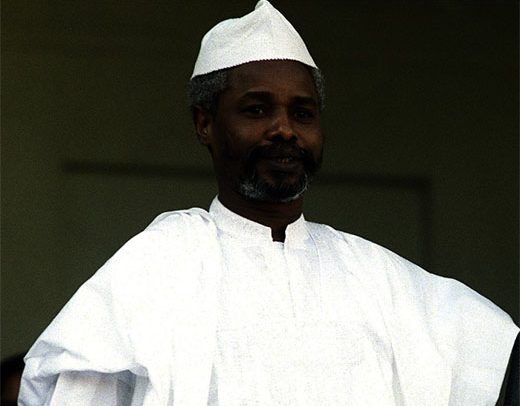Chad’s ex-ruler Hissène Habré has died at the age of 79 while serving a life sentence for crimes against humanity.
He was being treated for a coronavirus infection, reports say.
Habré was found guilty in 2016 of crimes committed while he was president from 1982 to 1990.
The conviction was the result of a landmark trial in Senegal. It was the first time an African Union-backed court had tried a former ruler for human rights abuses.
Habré was accused of being behind rape, sexual slavery and ordering killings while in power. He denied any knowledge of the crimes.
A commission of inquiry formed in Chad after he was deposed in 1990 said his government carried out some 40,000 politically motivated murders and 200,000 cases of torture in the eight years he was in power.
Former Chadian dictator Hissene Habre (C) is escorted by prison guards into the courtroom for the first proceedings of his trial by the Extraordinary African Chambers in Dakar on July 20, 2015.
Hissène Habré remained defiant throughout his trial
During the trial, survivors recounted gruesome details of the torture carried out by Habré’s feared secret police.
One of the most notorious detention centres in the capital N’Djamena was a converted swimming pool.
Witnesses said victims endured electric shocks, near-asphyxia, cigarette burns and having gas squirted into their eyes.
In 1990, he was overthrown by rebels, eventually seeking refuge in Senegal.
Two decades later, a court in Chad sentenced him to death in absentia for crimes against humanity.
Commenting on Habré’s death, Reed Brody, who had helped campaign for the ex-president to be put on trial, said he “will go down in history as one of the world’s most pitiless dictators, a man who slaughtered his own people”.
The trial in Senegal was the culmination of years of campaigning by his victims and their families.
After a lot of wrangling, the African Union signed a deal to set up a special tribunal to try the former leader.
Habré seized power in 1982 from Goukouni Oueddei, a former rebel comrade who had won elections.
It was widely believed that he was backed by the CIA, as a bulwark against Libya’s then leader Colonel Muammar Gaddafi.
His coup came in the middle of a war with Libya over a disputed piece of land
Backed by the United States and France, Habré’s forces drove out the Libyans in 1983. He was also backed by the French.
Source: BBC


